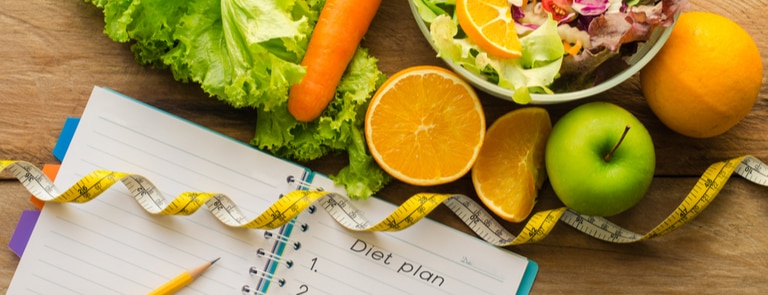15% off €25
The benefits of following a diet plan

You may be going on a diet because you would like to have more energy during the day.
Or maybe because you have become more aware of where your food comes from and would like to change how you relate to what you eat.
Perhaps you would like to lose or gain weight. Or you have a health issue that requires you to eat more of certain foods or nutrients.
Whatever your reasons, changing the sorts of foods you have eaten for most of your life can be a real challenge.
It can take around a month for a new habit to set in, and two months for it to become automatic.1
And naturally, there are external factors that impact just how close your new habit comes to those figures.
There is a big difference between deciding to sleeping in more, for example, and having to give up some of your favourite foods (or eat them less).
This is where a diet plan can come in handy.
It can help keep you on track, and even motivated. From a pragmatic standpoint alone, a diet plan is helpful, because you can look ahead to your meals for the weak and ensure you get everything you need on your shopping trip (and that you do not sneak in things you need to avoid!)
Setting goals and seeing progress
The only way to have a healthier diet, and to lose weight fast (if that is your main motivation) is to make permanent changes to the way you eat and exercise.
If, for example, you drop all carbs for two weeks, you will indeed lose some weight, but it will come straight back when you go back to eating as you used to.
There are various plans available online, but your starting point will be knowing what sort of plan you would like.2
Alternatively, you might prefer to build your own plan, or work with a professional to do so.
Either way, your starting point will be a few clear and concrete goals.
Once you have those, you can build a meal plan around the changes you need to make to get there.
And once you have that plan in place, you can then observe your progress.
A new diet is a tough gig, and the health benefits from it may be quite gradual.
If your plan involves building up the amount of a certain food you consume, or reducing your consumption of a certain food, you will be able to see just how far you have come on a daily or weekly basis.
Record your progress
It is also worth recording your progress as part of your diet plan.
At the end of each day or week, you can note things like how many calories you consumed, how much you exercised, your current weight, how much energy you have, or other indicators that correspond to your health goals.
Sustainable diet changes and weight loss tips
There are seemingly small changes you can make to your diet, which, if sustained in the long term, can lead to weight loss and other health benefits.
How to lose weight
Some changes you could incorporate into a weight loss diet plan could include drinking milk, or plant-based drinks lower in fat instead of full-fat milk with your morning coffee, to reduce the amount of fat you consume.
Likewise, if you drink four coffees a day, each with three teaspoons of sugar, that amounts to a lot of sugar over the course of the day.
You could go down to two coffees, and one spoon of sugar. These kinds of changes are less radical, and more sustainable long term.
Aim to eat wholegrain foods, like wholemeal bread, brown rice, and pasta. Your body digests these foods more slowly, so you will feel full for longer.
Aim for five portions of fruit and vegetables a day, and swap out fizzy drinks and sugary juices for teas.3
A safe and nutritious diet
There are some nutrients that you need to make sure you are getting sufficient amounts of every day. These include protein, carbs, fats, water, and certain minerals and vitamins.4
However, a lot of dieting work just involves making sure you get a balanced intake across the week.
For example, it is recommended that you get at least 225 grams of fish per week.5
Following weight loss programmes can help ensure that you get the amount of calories you need (no more than 1,900 a day for men and 1,400 for most women) as well as all the nutrients.6
It can also make sure you lose weight (if that is your goal) at a safe rate of 0.5 to one kilogram a week.
To do that, you will need to cut around 600 calories from your diet per day. However, let’s say on Sunday you only cut 400 calories, you can always make up for that over the rest of the week.
Last updated: 10 March 2021
- https://jamesclear.com/new-habit
- https://www.nhs.uk/live-well/healthy-weight/start-the-nhs-weight-loss-plan/
- https://www.nhs.uk/live-well/healthy-weight/how-to-diet/
- https://www.healthline.com/health/food-nutrition/six-essential-nutrients
- https://www.fda.gov/food/consumers/advice-about-eating-fish#:~:text=The%202015%2D2020%20Dietary%20Guidelines%20for%20Americans%20recommends%3A,that%20are%20lower%20in%20mercury.
- https://www.nhs.uk/live-well/healthy-weight/start-the-nhs-weight-loss-plan/
- https://www.nhs.uk/live-well/healthy-weight/start-the-nhs-weight-loss-plan/



